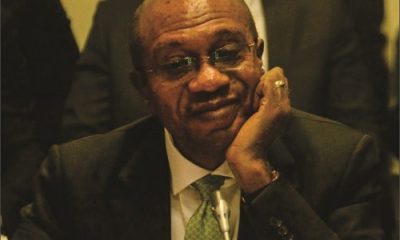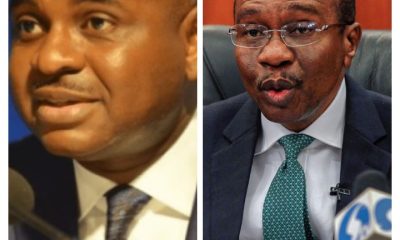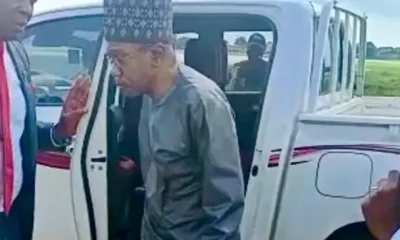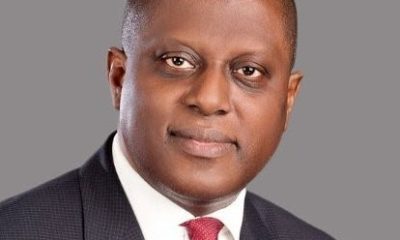Headline
Emefiele Names Monarchs, Army Generals, Judges As Accomplices

Emefiele Identifies Top Traditional Rulers, Army Generals, Judges As Accomplices Amid Corruption Scandal
Godwin Emefiele, the suspended governor of the Central Bank of Nigeria, who is currently in the custody of the Department of State Services (DSS) has identified some traditional rulers, Nigerian Army generals and judges as his accomplices, SaharaReporters learnt from DSS sources.
Emefiele, who is said to be “cooperating with investigators” reportedly narrated how he gave money to monarchs, army generals and judges at some point or the other during his time in office.
The suspended CBN governor has been in detention along with Abdulrasheed Bawa, the suspended Chairman of the Economic and Financial Crimes Commission (EFCC) after both of them were suspended from their respective offices by President Bola Tinubu’s administration over corruption allegations and abuse of office.
SaharaReporters on June 15 reported how Emefiele named Bawa as an accomplice in the Naira redesign scam that rocked the country some months ago.
SaharaReporters had learnt that Emefiele and Bawa – both undergoing interrogation – were being quizzed on sundry issues including the Naira redesign scam.
Giving SaharaReporters update on Wednesday, DSS sources claimed that Emefiele was “revealing a lot” and had named some top accomplices in his mismanagement of the country’s apex bank.
“As per Emefiele, he is cooperating with investigators and revealing a lot. Emefiele corrupted and bribed almost every major traditional ruler, army generals, some judges and clerics,” one of the sources revealed.
“Almost all the CBN directors are also being quizzed and they too are cooperating,” he added.
SaharaReporters had earlier reported that Emefiele was suspended “sequel to the ongoing investigation into his office and the planned reforms in the financial sector of the economy,” according to a release by Willie Bassey, the Director of Information for the Secretary to the Government of the Federation, George Akume.
On November 23, 2022, then-President Muhammadu Buhari alongside Emefiele unveiled new naira notes in denominations of N200, N500 and N1,000. Emefiele insisted that the old notes would cease to be legal tender from January 31, 2023.
Addressing journalists after the event, Emefiele insisted that the move was not targeted at anyone as there were speculations that the move was pushed by the cabal in the Presidency and targeted at preventing Bola Tinubu, then-presidential candidate of the ruling All Progressives Congress from winning the February 25, 2023 election.
The policy caused Nigerians untold hardship due to the scarcity of naira notes with the CBN unable to meet the demand for new notes. The policy led to a cash crisis and long queues at banks and ATMs.
“Emefiele who is currently cooling his feet in the cell of the DSS is the reason why the EFCC chairman has been detained overnight. Emefiele who is cooperating with the DSS claimed that Bawa was the one who raised a memo to former President Muhammadu Buhari, asking that the Naira should be redesigned to stem money laundering during the 2023 election,” a top source had revealed to SaharaReporters.
“Bawa confronted him that he (Emefiele) and the former Attorney-General of the Federation, Malami were the ones that came to him to raise the memo because they suspected Tinubu had warehouses stuffed with naira notes,” the source had added.
In February and March, Nigerians were subjected to extreme difficulty with the Naira redesign and cashless policy due to the scarcity of the new Naira notes.
To make matters worse, Emefiele had refused to heed a Supreme Court ruling which made the old notes legal tender till December 31, before former President Buhari distanced himself from the disobedience to the court order.
SaharaReporters in February reported how the DSS attempted to arrest Emefiele, but the then Chief of Defence Staff, Gen. Lucky Irabor, shielded him by providing soldiers to guard his residence and office.
The DSS had said it intensified its investigations to arrest and prosecute Emefiele, on allegations of terrorism financing and fraud.
SaharaReporters also in February reported that new court documents obtained from the DSS indicted Emefiele for funding “unknown gunmen” terrorising the Southeast region of the country.
Headline
Fagbemi warns against obstructing EFCC from performing its lawful duty

The Minister of Justice, Lateef Fagbemi, SAN has warned against obstructing the Economic and Financial Crimes Commission (EFCC) from carrying out its lawful duty .
Fagbemi’s warning is contained in a statement in Abuja.
“This is a matter of very grave concern, it is now beyond doubt that the EFCC is given power by the law to invite any person of interest to interact with them in the course of their investigations into any matter, regardless of status.
“Therefore, the least that we can all do when invited, is not to put any obstruction in the way of EFCC, but to honourably answer their invitation.
“A situation where public officials who are themselves subject of protection by law enforcement agents will set up a stratagem of obstruction to the civil and commendable efforts of the EFCC to perform its duty is to say the least, insufferably disquieting’’.
He added that running away from the law will not resolve issues at stake but only exacerbate them.
“Nigeria has a vibrant judicial system that is capable of protecting everyone who follows the rule of law in seeking protection.
“I therefore encourage anyone who has been invited by the EFCC or any other agency to immediately toe the path of decency and civility by honouring such invitation instead of embarking on a temporising self-help and escapism.
“This can only put our country in bad light before the rest of the world’’.
He said institutions of state should be allowed to function effectively and efficiently.
“I stand for the rule of law and will promptly call EFCC, and indeed any other agency to order when there is an indication of any transgressions of the fundamental rights of any Nigerian by any of the agencies’’.
NAN reports that the EFCC had on Wednesday warned members of the public that it was a criminal offence to obstruct officers of the Commission from carrying out their lawful duties.
Section 38(2)(a(b) of the EFCC Establishment Act makes it an offence to prevent officers of the Commission from carrying out their lawful duties. Culprits risk a jail term of not less than five years.
The warning , the EFCC said, became necessary against the background of the increasing tendency by persons and groups under investigation by the Commission to take the laws into their hands by recruiting thugs to obstruct lawful operations of the EFCC.
On several occasions, the anti graft agency said, operatives of the Commission have had to exercise utmost restraint in the face of such provocation to avoid a breakdown of law and order.
Headline
Unknown Gunmen Abduct Channelstv Reporter In Port-harcourt

Some unknown gunmen have kidnapped Joshua Rogers, the ChannelsTV reporter in Port-Harcourt, the Rivers State capital.
Politics Nigeria learnt that Rogers was picked up close to his residence at Rumuosi in Port Harcourt and to an unknown destination by the gunmen around 9pm on Thursday, April 11.
The reporter was driving his official ChannelsTV branded car when the hoodlums accosted, pointed a gun at him and took him away in the same vehicle.
Rogers was said to be returning from his official assignment in Government House after a trip to Andoni for a government event when the incident happened.
Already, the gunmen were said to have contacted his wife and demanded a N30million ransom for bis release.
His cameraman confirmed the incident and appealed to his abductors to set him free unconditionally.




















